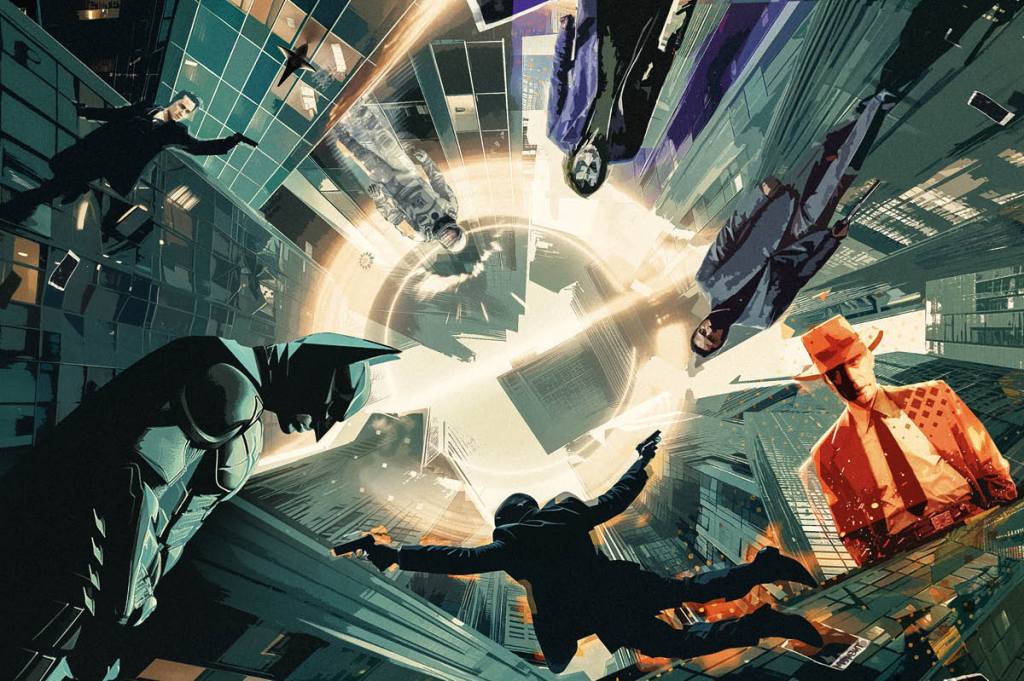At this year’s Oscars ceremony, there was a moment that only those blind to symbolism could have failed to pick up. The presenter of the Best Director award was none other than Steven Spielberg, himself the most commercially successful film director who has ever lived. The recipient was Christopher Nolan, whose films so far this millennium have grossed over $6 billion worldwide, making him the seventh-highest earning filmmaker of all time. Those above him — no disrespect to the likes of the Russo brothers, David Yates and even Michael Bay — are journeymen directors whose franchise work makes a lot of money without bothering the Academy; the auteur-ish likes of Peter Jackson, James Cameron and Spielberg have all now been rewarded with their own Best Director Oscars.
As Nolan now has, after being disappointed for films including Inception, Dunkirk and Memento. The presence of Spielberg, handing on the torch to the younger man, was a powerful reminder that every generation has its leading filmmaker, and the now Oscar-winning Nolan can legitimately claim to be his. Oppenheimer was not only the third highest-grossing film of 2023, but also its best, representing a rare case where public taste and critical adulation lined up with one another. It won seven Oscars, including Best Film and Best Director, and its success has meant that Nolan now has carte blanche to do whatever he likes; if, that is, making a three-hour, R-rated biopic of a nuclear scientist partly in black and white can be viewed as anything other than an A-list director’s expression of total control.
Where Nolan goes next will be fascinating. Since his first low-budget picture, 1998’s Following, he has established himself as that rare, possibly unique thing: a creator of big-budget spectacle who has also retained an arthouse sensibility that enables him, somehow, to be the missing link between Nicolas Roeg and Zack Snyder. His films are intellectually demanding studies of fractured identity, usually set over multiple time periods, and revolving around intense male performances by acclaimed leading actors who unfailingly raise their A-game for Nolan. They also contain explosions, epic cinematography (usually presented in the IMAX format that he has become synonymous with), booming scores (firstly by Hans Zimmer and now by his replacement, Ludwig Göransson, who won an Oscar for Oppenheimer) and portentous dialogue that seems intended to turn into memes the second the excited audience leaves the cinema. In other words, a Christopher Nolan picture is a lot.
I can’t remember the last time that I walked out of the latest Nolan film and did not feel a combination of exhilaration, confusion and excitement. Sometimes, the confusion dominated. 2020’s Tenet, an impressionistic blend of image, sound and collage, saw Nolan’s undeniable technical skill subsumed beneath a storyline that was initially hard to follow. (And, dare I say it, it represents the only time in his filmography so far that his choice of leading man was a disappointment: John David Washington is a perfectly respectable actor, but he was blown off the screen by the far more charismatic and entertaining Robert Pattinson, to say nothing of the superb Elizabeth Debicki.)
;768:[300×250,336×280,320×100];0:[300×250,320×100,320×50]”]Every director has a flop, and, to date, Tenet is Nolan’s only disappointment, although its comparatively muted commercial reception ($365 million gross on a budget of $200 million) can at least partly be ascribed to its being released during the Covid pandemic. Nolan, a committed advocate of the theatrical experience, ignored Warner Brothers’ warnings that it was the wrong time to bring the film out, and insisted on its being distributed in September 2020, when numerous cinemas in New York and Los Angeles were still closed. It grossed an underwhelming $58.5 million in the United States, and despite a recent re-release to coincide with the victory lap of Oppenheimer’s awards-seasons triumph, remains Nolan’s least-recognized major film, at least since his breakthrough into mainstream pictures with 2005’s Batman Begins.
Still, most filmmakers would kill to have something as ambitious and interesting — if flawed — as Tenet as their least successful picture to date. (It should also be noted that $365 million, in Covid times, was vastly impressive on its own terms; presumably it would have at least equaled Interstellar’s $731 million under normal circumstances.) And it fits within the saga of its director’s life and work. The early years of Nolan’s career have been retold and pored over so many times they’ve passed into legend. How he ran his student film society at University College London, using the revenue from screenings of cult classics such as Blade Runner to finance his first short films; how his then-girlfriend, now-wife Emma Thomas has been his most steadfast collaborator, producing all his pictures from Following onwards.
How he moved from no-budget British indie (Following) to low-budget American independent picture (Memento) to mid-budget American thriller (Insomnia) to big-budget superhero blockbuster (Batman Begins) in a matter of a mere seven years. How the Batman sequel The Dark Knight turned him into that rarest of things — a cult director with a massive mainstream following — and how, through a combination of boldness, daring and ruthless single-mindedness, he has blazed a trail that many have sought to imitate, and only perhaps Denis Villeneuve, of his peers, has come anywhere near to emulating. And now, how he stands alone, a double Oscar-winner who, at the age of fifty-three, can do literally whatever he wants next, regardless of cast, budget or subject: a rarity in an industry that is now so risk-averse as to be neutered and dull.
Nolan has accomplished all this without making obvious enemies or losing his reputation for intellectual rigor. He is helped immeasurably by his wife and producer; her combination of utter efficiency and charm has led to the Nolan-Thomas partnership being described by Nolan’s Oppenheimer star Cillian Murphy as “the most dynamic, decent, kindest producer-director partnership in Hollywood.” Nolan works repeatedly with the same actors (including Murphy), crew and technical personnel, and his vastly ambitious endeavors come in on or below budget, and on schedule.
He has a reputation for gentlemanly, if slightly old-fashioned, manners both on and off set, wearing three-piece suits and refusing to allow chairs for his actors; it was interesting, and lightly amusing, to see him drop what has been seen as a quintessentially English (despite his being half-American) stiffness during the awards season campaign for Oppenheimer and embrace a lighter side of his personality, not least a farcical interlude on Stephen Colbert’s show where both men ran around to the sound of the Benny Hill theme tune. This is a significant departure — his awesomely serious films are hardly rich in thigh-slapping laughter. There are usually one, perhaps two wry smiles to be had per picture, although I still treasure the moment in The Dark Knight when Morgan Freeman’s character patiently explains to someone who is attempting to blackmail Bruce Wayne, having discovered his dual identity as Batman, that if a psychotic billionaire spends his evenings dressed as a bat beating up malefactors, he is unlikely to look kindly on such an infringement on his private life.
;768:[300×250,336×280,320×100];0:[300×250,320×100,320×50]”]I am by no means a fully paid-up Nolan fanboy. Of his eleven “proper” films to date — Following must be regarded as a promising piece of juvenilia rather than a fully-fledged picture — about two-thirds are truly excellent pieces of cinema that will, I believe, be watched and enjoyed by audiences as long as film remains an artform. The others — Insomnia, Batman Begins, Interstellar and Tenet — are either accomplished pieces of genre filmmaking lifted to another level by their director and cast, or hugely ambitious pictures that nonetheless have severe flaws of storytelling and construction that prove that their auteur is only human, after all, and as capable of missing the mark as anyone else. Still, I’d rather watch a Tenet, with all its fascinating attempts to reach profundity, than any number of more successful but less interesting films that have aimed considerably less high. Better a fallen rocket than never a burst of light.
One of the central points of interest of the Batman trilogy is the way in which Christian Bale’s tormented and brooding Wayne comes to realize that his crime-fighting alter ego has taken on symbolic qualities far removed from his initial intentions. This, in a way, reflects how Nolan’s pictures have seen him become a savior of contemporary cinema. In his well-judged acceptance speech for Best Director, he remarked “movies are just a little bit over 100 years old. We don’t know where this incredible journey is going from here. But to know that you think I’m a meaningful part of it means the world to me.” This “meaningful part” is something that only a few very filmmakers can truly say they are, including, of course, Spielberg, the man who defined blockbuster entertainment in the last quarter of the twentieth century.
If Spielberg is — to contradict the final lines of The Dark Knight — the cinematic hero that we deserve, it is the now knighted Nolan — a more cynical, less optimistic filmmaker — who is the one that cinema needs right now. Wherever he goes from here, it can only be thrilling.
This article was originally published in The Spectator’s May 2024 World edition.


























Leave a Reply